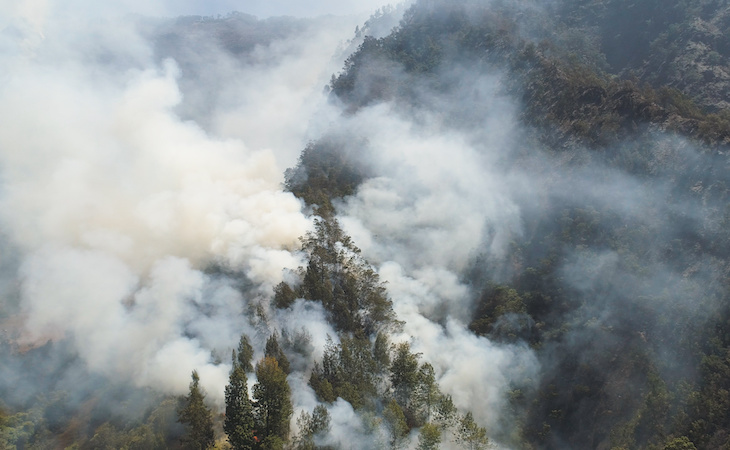Wildfires are becoming more and more common. These natural disasters are afflicting numerous forests, with surrounding air quality being severely impacted each time due to wildfire smoke. Many people are familiar with the recent Canadian wildfires from which smoke and debris traveled as far as the Great Lakes region, mid-Atlantic area, and even into parts of Europe during the summer of 2023.
Wildfire smoke in the air can be harmful to human health due to its negative impact on air quality. The smoke can cause symptoms such as coughing, stinging eyes, and headaches. One of the most harmful ways wildfire smoke can impact health is by negatively affecting breathing. People who have heart problems or lung diseases like asthma or chronic obstructive pulmonary disease (COPD) can be particularly sensitive to wildfire smoke inhalation.
Even worse, when the air is filled with wildfire smoke, it can make it more difficult to sleep. This article will explore how wildfire smoke may affect your sleep and what you can do to prevent wildfire smoke from ruining it.
The sleep and health effects of wildfire smoke
Wildfire smoke is a mixture of gas, water vapor, and other fine particles that result from the burning of various substances including vegetation and other materials in the fire’s path. The Centers for Disease Control and Prevention (CDC) reports that wildfire smoke can cause immediate health effects, even for healthy individuals if the smoke is bad enough.
These include:
- Coughing
- Trouble breathing
- Stinging eyes
- Scratchy throat
- Runny nose and sinus irritation
- Wheezing
- Shortness of breath
- Chest pain
- Tiredness
- Fast heartbeat
- Asthma attack
- Headaches
Those with preexisting lung or heart conditions like asthma, COPD, or heart disease may be more susceptible to sickness from breathing in wildfire smoke.
If wildfire smoke is affecting the air quality where you live, you may have trouble sleeping if you experience any of the listed health effects like coughing or trouble breathing.
Additionally, knowing there’s a nearby natural disaster can be stressful. This may cause anxiety, insomnia, and nightmares, all of which are detrimental to good sleep, according to this systematic review.
How to sleep better when there’s wildfire smoke
Luckily, according to the U.S. Environmental Protection Agency, there are steps you can take to stay as safe and healthy as possible and ensure your sleep is minimally disrupted if you’re in a wildfire zone.
First, stay inside and keep windows and doors closed. These physical barriers help keep the smoke outside your home, protecting your lungs from the smoke and helping you get better sleep.
Second, use an air filter if possible. A freestanding air filter can help remove damaging smoke particles from the air in your home, allowing you to breathe and sleep better.
Additionally, don’t perform activities that can add to indoor air pollution like burning candles, smoking cigarettes indoors, or lighting fires in fireplaces. This will only add to the smoke from the wildfire. The CDC also recommends against vacuuming since this can stir up particles in the home as well.
Surgical or cloth face masks don’t generally provide any added protection since the particles in wildfire smoke are too small to be effectively blocked by these types of face coverings, so it’s not recommended to wear these.
Finally, if you find yourself feeling stressed about the wildfire, try and do something relaxing before bed like drinking an herbal tea, meditating, reading a book, or practicing yoga.
Although wildfire smoke can impact breathing and cause stress, the above measures should help you in achieving a good night’s sleep even if you find yourself in a wildfire zone. (Here’s how to emergency-proof your bedroom for any situation.)
FAQs
How long does it take for smoke inhalation to affect you?
Smoke inhalation can affect you immediately, causing coughing, burning or stinging eyes, scratchy throat, and more. If you have lung disease or other chronic respiratory or heart conditions, you may be even more susceptible to the health effects of wildfire smoke.
Can fire smoke make you tired?
Yes. The CDC reports that fatigue is a potential health effect of inhaling wildfire smoke. This may be related to the body’s response to smoke and increased work of breathing and coughing while breathing wildfire smoke.
How do you recover from wildfire smoke?
Luckily, most people recover quickly after being exposed to wildfire smoke. Waiting out the smoke by staying indoors as much as possible will help mitigate any acute effects and help you recover as quickly as possible. If you have concerns over your breathing function, coughing, or wheezing after being exposed to wildfire smoke, it’s a good idea to see a healthcare professional as well.
There are a number of ways climate change can impact your sleep. Next, learn about how climate change can interrupt your sleep and how to deal with it.




